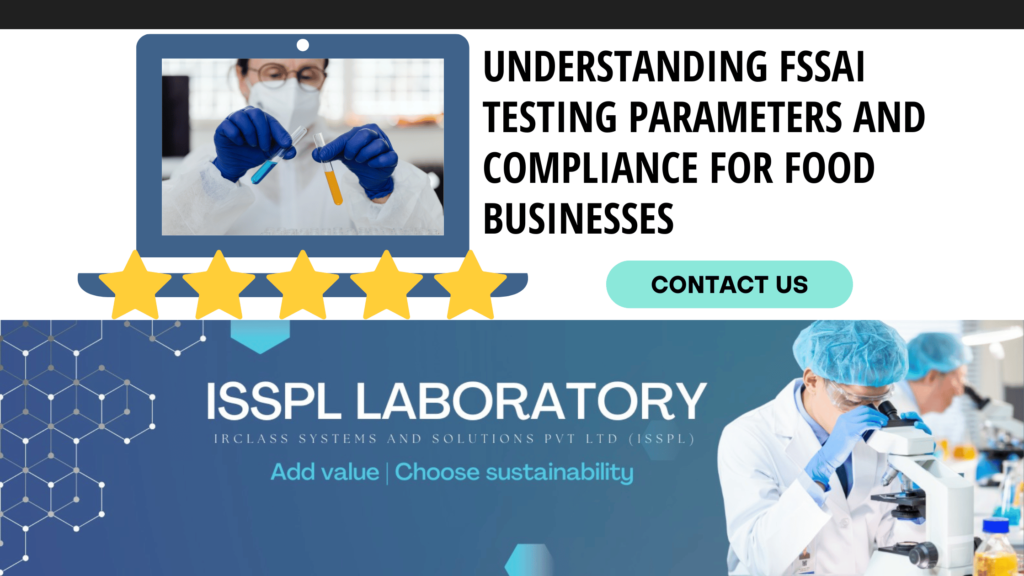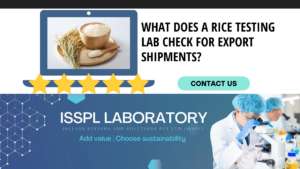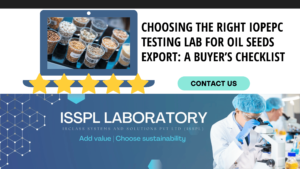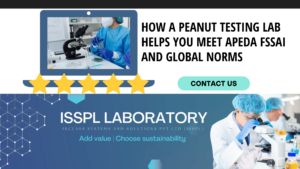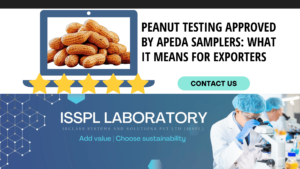An Overview by Team ISSPL - Analytical Testing Laboratory in India
ToggleFood safety is not just a legal step. It is how you make sure that the product you are selling will not fail in the market. Every food business that makes or handles products in India must follow the rules set by the Food Safety and Standards Authority of India. These rules are based on testing along with lab-based checks and documented evidence.
The Role of FSSAI in Food Product Testing
FSSAI controls the standards for food safety across all regions of India. The authority defines what kind of food must be tested and what parameters must be covered. This includes raw materials along with processed goods and packaged items.
Once a product is ready it cannot be sold or exported unless it passes the tests required by the category it belongs to. These tests must be done by labs that are approved under FSSAI and have ISO 17025 certification.
How Testing Works Across Food Product Categories
FSSAI uses different test types depending on the nature of the product. Food categories are divided based on the risk they carry during storage or consumption.
Low-risk foods such as grains or dry pulses are tested for basic parameters. High-risk products such as dairy along with meat and ready-to-eat items go through microbiological and chemical tests.
The tests must match the method and range allowed by the FSSAI testing manual. The results must be traceable to the exact batch that was produced.
Testing Parameters That Must Be Checked
The list of parameters is based on what the food is made of and how it is processed. Labs follow methods that are verified and repeatable under specific conditions.
Here are the most used parameters:
- Microbial load which includes total plate count along with yeast and mould in dairy and meat
- Heavy metal detection for lead along with arsenic and cadmium in spices and herbal products
- Pesticide residue in fruits along with vegetables and raw grains
- Nutritional values to confirm label claims for protein along with fat and carbohydrate
- Added preservatives and colour levels in packaged snacks and processed foods
These tests are done using instruments like HPLC along with GC-MS and ICP-MS based on the requirement.
Role of Accredited Labs in Food Compliance
FSSAI only accepts reports from labs that hold ISO 17025 and are approved for food testing. The lab must follow documented methods and maintain calibration records for every instrument used.
Reports must carry full sample traceability and be issued by analysts with verified credentials. The format of the report must include the sample date along with test method and unit of measurement.
If the lab is not approved or the report is incomplete the result is considered invalid by FSSAI inspectors.
When and How Often Testing Should Be Done
The frequency of testing depends on the type of food and the conditions in which it is stored. High shelf life does not remove the need for testing. Every batch must be backed by a report that shows clear results.
Testing is usually done:
- During product development to confirm nutritional claims
- Before launch of new products or variants
- For every production batch that goes to export
- As part of quality checks across production and packaging stages
- During periodic audits or license renewals with state or central authorities
Delaying testing or skipping random batch checks can result in license suspension and product withdrawal from the market.
What Happens When Products Fail Testing
When a batch fails an FSSAI parameter the report must be reviewed by the internal quality team. The root cause could be raw material failure or contamination during processing.
Should there be failure the whole batch should be segregated and reported in case it is already in distribution. Recurring failures result in food inspector action. This can involve shutting down of operations as well as product recall and lawsuits.
The records should be kept of each test carried out and the corrective action taken.
How Businesses Can Plan for Reliable Compliance
Early scheduling of testing by food businesses tends to eliminate last minute delays and cost overruns. The delay in the form of waiting till an inspector or buyer requests reports can create problems in supply and shipment delays.
Five things that businesses can do are:
- Choose a lab that has valid FSSAI and NABL approval of all the necessary parameters.
- Create a batch-based testing calendar, which is dependent on the shelf life and product category.
- Keep electronic files of every test report as well as batch identifiers.
- Train internal teams to interpret lab reports and indicate early variation.
- Collaborate with laboratories where schedules are clear and the procedure of conducting a test is transparent.
This will minimize guesswork and will aid in ensuring consistency of products in various regions.
Issues That Can Delay or Disturb Testing Results
There are technical reasons why reports sometimes fail or take longer than expected. Some of the most common issues include wrong sampling methods along with poor storage during sample transport.
In many cases the lab may not have the right instrument for the requested detection range. For example low-level detection of pesticide residue needs LC-MS/MS with proper calibration and internal standards.
Errors in sample labelling or mismatch in documentation can also lead to repeat testing and wastage of time and material.
Regulatory Support from Accredited Labs
A strong lab partner does more than just test. It helps your team prepare the documents that go with compliance checks and export audits. This includes method validation support along with sampling SOPs and report formats that meet both Indian and foreign buyer standards.
Some labs also support internal training for QA teams so they can handle first-level product checks without sending every sample to the lab. This saves time across large production units.
Final Word
IRCLASS Systems and Solutions Pvt Ltd (ISSPL Lab) assists food industries with FSSAI-approved testing (including chemical analysis and microbial screening and nutrition validation). Their laboratory has the appropriate approvals and operates in all types of food with a high level of concern on quality and traceability.
FAQs
1. Which labs can conduct FSSAI food testing?
Only labs with ISO 17025 certification and FSSAI approval are authorized. They must maintain proper calibration records and provide full sample traceability. Reports from unapproved labs are considered invalid.
2. What parameters must be tested?
Testing depends on food type. Common parameters include microbial load for dairy and meat, heavy metal detection for spices, pesticide residue for produce, nutritional values, and preservatives/colours in packaged foods.
3. How often should products be tested?
Every production batch must have a test report. Testing occurs during product development, before launch, for export batches, during production quality checks, and during license renewals. High shelf life doesn’t eliminate testing requirements.
4. What happens if a batch fails testing?
The quality team must investigate the root cause and segregate the batch immediately. If already distributed, the failure must be reported. Recurring failures can result in license suspension, product recall, and legal action.
5. How can businesses ensure FSSAI compliance?
Choose an accredited lab with all necessary approvals, create a testing calendar based on product shelf life, maintain electronic test records, train internal QA teams, and work with transparent lab partners. Early scheduling prevents delays and cost overruns.
